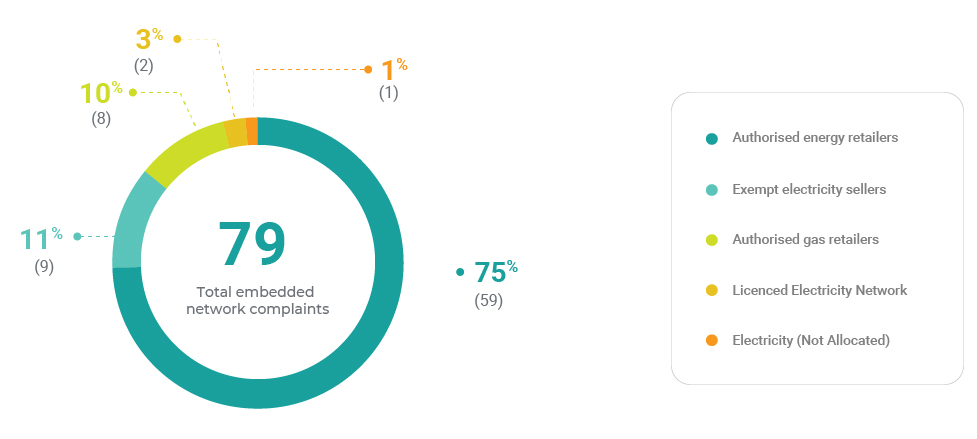-
Home
-
Publications and submissions
-
Reports
-
EWON Insights
-
EWON Insights Oct-Dec 2020
- Embedded network complaints
Embedded network complaints
In the October to December 2020 quarter we opened 79 complaints from embedded network customers. These complaints were from the following categories:
- Authorised energy retailers: 59
- Exempt electricity sellers: 9
- Authorised gas retailers: 8
- Licenced Electricity Network: 2
- Electricity (Not Allocated): 1

Table 8 - Top issues for embedded network complaints closed this quarter
| Complaint issues | Cases |
|---|---|
| Billing > High > Disputed | 31 |
| Billing > Opening/closing account | 13 |
| Customer service > poor service | 12 |
| Billing > Tariff > rate | 11 |
| Customer service > failure to respond | 10 |
| Billing > Backbill | 7 |
| Credit > payment difficulties > current/arrears | 5 |
| Billing > period | 5 |
| Customer service . incorrect advice/information | 4 |
| Billing > other | 4 |
Case studies
Some customers in embedded networks are not aware of which entity is responsible for dealing with energy and water matters, which may lead to difficulty in resolving disputes.
Advocate unclear about who bills customer
An advocate advised us that a customer has been at the supply address since October 2018. He received quarterly bills from September 2019 for $196, $2,609 and $2,463. The advocate considered that the customer had been incorrectly charged a business tariff instead of a residential tariff.
The advocate told us that after numerous calls, the retailer reviewed the matter in July 2020. However, three months later the retailer said that the building’s body corporate was responsible for the issue. The advocate said that he then contacted the building’s body corporate which told him that the retailer was responsible for the issue.
With the advocates agreement, we referred him back to the retailer at higher level, knowing he could return to us if the matter was not resolved satisfactorily.
Consumer protections
Customers in embedded networks do not have the same consumer protections that other customers have. This may lead to confusion about which protections apply within embedded networks.
Customer unsure of her rights
An advocate contacted us as she thought the retailer was charging more than the standard retail contract prices. The advocate advised that the customer was being billed for peak charges regardless of the time of the day. The advocate also considered that the bills contained errors such as adding late payment fees, incorrect disconnection notices and low solar credits.
The advocate said she contacted the retailer and it explained how to leave the embedded network, however she was unable to find a retailer which was willing to take over the meter and the billing rights. She said that the retailer told her they cannot assist further regarding the pricing and would investigate the issues about the billing agent.
We referred this case back to the retailer at a higher level, but the customer returned to us. She told us that the retailer informed her that the exempt selling guidelines did not apply, and she may be at risk of disconnection if she did not agree to the contract offered. She also said that the service availability charges had increased.
We advised the customer that the retailer is an authorised retailer, and provided information about what this means. Specifically, the National Energy Retail Law (NERL) and the National Energy Retail Rules (NERR) apply to the authorised retailer’s electricity accounts or bills. Further, the retailer is not required to comply with the provisions of the Residential (Land Lease) Communities Act 2013 or the Regulation. We reviewed the standing offer for the area and advised the customer that the retailer was not charging more than the standing offer.

